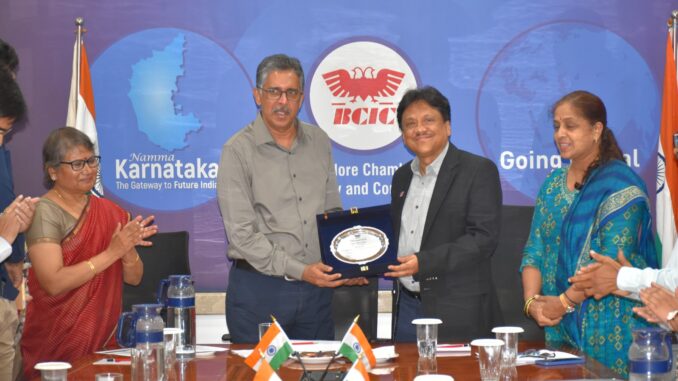 Bengaluru, October 31, 2025: The Bangalore Chamber of Industry and Commerce (BCIC) successfully hosted an interactive session with Shri Salil Sankar, Regional Commissioner, Employees’ Provident Fund Organisation (EPFO), Bengaluru. The session brought together representatives from industry, HR leaders and compliance professionals to discuss the EPFO’s recent initiatives focused on simplifying and digitizing compliance processes for employers and employees.
Bengaluru, October 31, 2025: The Bangalore Chamber of Industry and Commerce (BCIC) successfully hosted an interactive session with Shri Salil Sankar, Regional Commissioner, Employees’ Provident Fund Organisation (EPFO), Bengaluru. The session brought together representatives from industry, HR leaders and compliance professionals to discuss the EPFO’s recent initiatives focused on simplifying and digitizing compliance processes for employers and employees.
The Regional PF Commissioner outlined the EPFO’s ongoing efforts to create awareness among employers and employees about the benefits and incentives which are provided by the Central Government for new employment generation under the Prime Ministers Vikisit Barath Rozgar Yogana (PMVBRY), the steps taken by EPFO to streamline workflows, reduce documentation burdens and improve turnaround time through digital platforms such as EPFO 3.0. The discussion covered simplified withdrawal categories, improved online claim systems and increased transparency in contribution and settlement processes.
The forum enabled an open exchange, allowing industry participants to share feedback and operational concerns. The Commissioner acknowledged the input and emphasized the importance of collaborative dialogue in shaping practical regulatory improvements.
Mr. K. Ravi, Senior Vice President, BCIC, said “We at BCIC welcome initiatives that encourage meaningful engagement between the industry and the PF Department. Such dialogues are not just beneficial but they are essential for encouraging trust, clarity and a shared sense of purpose among employers, employees and the department. Given that BCIC represents over 800 large and medium enterprises across Karnataka, we believe our active participation in the Regional Committee under the Employers’ category will add significant value. We look forward to supporting the PF Department in its efforts and contributing constructively to policy discussions and implementation.”
Shri Salil Sankar, said, “Our goal is to ensure that social security systems are not just robust but also accessible and user-friendly. The recent initiatives by the Government for employment Generation, reforms and digital initiatives are steps toward Employment Generation in the country, reducing procedural complexities and enabling faster, transparent and seamless services. Engagements like today’s are important for us to understand ground-level challenges and continuously refine our approach.”
“The Commissioner’s address highlights the ongoing effort by the EPFO to balance digital modernization with administrative challenges and stakeholder relations. The organization is prioritizing ease of business through efficient appointment systems and by addressing employee conduct via sensitization programs. Acknowledging that the 2011 shift to digital, particularly the introduction of the Universal Account Number (UAN), led to chaos and required massive effort to validate data (now reaching 99.73% Aadhaar-seeded accounts), the EPFO is focusing on stabilizing the system. Recent process simplifications now instruct staff to prioritize claim settlement over minor deficiency checks for validated members, demonstrating a commitment to service. However, the Commissioner also stressed that employers must cooperate by correctly filing the Electronic Challan cum Return (ECR) and managing exit dates to prevent further complications in member accounts,” added Shri Salil.
Smt. Saraswathi K, Chairperson, BCIC Expert Committee on Human Resources: “Provident Fund regulations are one of the key aspects that organisations need to comply with. To enhance ease of managing these, the EPFO has been constantly creating awareness among the stakeholders like employers and employees, simplifying and automating compliance requirements. The recently launched employment linked incentive scheme (PMVBRY) is a great incentive for employers to hire and retain employees. The revamped ECR, which is effective September 2025 is yet another step in this process. The Vishwas scheme, which would help close out on litigations is also expected to be notified soon. The PF authorities have been invested in educating the industry, through various forums. Through his constant interactions with the industry bodies, Shri Salil Sankar has provided significant insights on the intent behind the changes, provided solutions to practical challenges that are faced by organisations every day. While streamlining of the compliance process is very welcome, there is a need for the Government to also look at the regulations per se. For instance, under the Provident Fund and Miscellaneous Provisions Act 1952, notices may be issued by the authorities for any of the past periods, without any time limit. However, under the proposed labour codes, this Act will be subsumed under the Social Security Code, which provides for a period of limitation, which is 5 years. This would clearly provide certainty in compliances and reduce litigation. It is time for the Government to introduce such measures to enable certainty and enhance ease of compliance by the industry”.
The Session was in line with the announcement
of EPFO 3.0 focus on digital transformation and improved user experience. These include instant withdrawals via ATMs or UPI platforms, and auto-claim settlement to speed up processing times. Users will benefit from digital corrections, allowing online updates of personal details like name or date of birth using OTP authentication, and the ability to perform real-time balance checks through popular UPI applications. Furthermore, improved accessibility is provided via a revamped, mobile-first app for account management. However, while the official EPFIGMS online grievance system is operational, user feedback on platforms like Quora and Reddit suggests its effectiveness can be inconsistent and frustrating, with many users reporting unresolved issues and often finding alternative methods, such as escalation, to be more effective for resolution.

